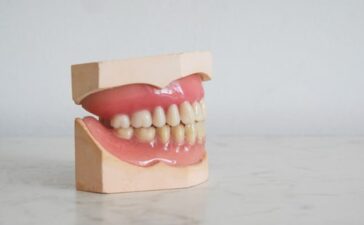Welcome to our most recent blog post, which is all about maintaining good oral health. For maintaining good oral hygiene and averting future dental issues, taking care of your teeth is crucial. We’ve got 10 great recommendations to maintain your teeth in peak shape, whether you’re a seasoned pro at brushing and flossing or are just beginning your dental journey. We’ll go over everything you need to know about how to take the greatest care of those chompers, from avoiding sugary drinks to wearing a mouthguard when participating in sports. So join us as we explore the field of dental health and let’s get started!
Brushing
To maintain proper dental hygiene, brushing is crucial. Using a fluoride toothpaste, you should brush your teeth twice a day for two minutes each time.
Use little circular motions and concentrate on each tooth individually when brushing. Don’t forget to brush your tongue, roof of your mouth, and the backs of your teeth.
Replace your toothbrush at least once every three months, or sooner if the bristles start to fray or wear out. Also, keep in mind that brushing alone is insufficient; you should also floss every day and see your dentist for checkups and cleanings on a regular basis, find out more here about brushing your teeth.
Flossing
To maintain proper oral hygiene, flossing is crucial. Plaque and food debris that a toothbrush can’t reach between your teeth are helped to eliminate. Many individuals disregard the value of flossing, although it can significantly reduce the risk of gum disease and maintain the condition of your teeth.

It is advised to floss at least once daily, especially right before bed when bacteria have more time to accumulate there. This easy action will help you maintain the health of your smile for years to come if you incorporate it into your regular practice.
Mouthwash usage
A crucial component of maintaining proper dental hygiene is using mouthwash. Your mouth will feel clean and fresh after using it since it can help destroy microorganisms that brushing and flossing may have missed.
However, not all mouthwash is made equally. Some of them contain alcohol, which can dry out the mouth and cause later dental issues. Instead, try to find a non-alcoholic variety.
Mouthwash should not be used in place of brushing or flossing in a comprehensive dental care regimen. Between dental appointments, including it into your everyday routine will help maintain your teeth and gums healthy.
Ask your dentist or hygienist for advice on the best mouthwash for you if you’re unsure based on their understanding of your particular needs.
Limiting sugary beverages
Sugary beverages are one of the main causes of tooth decay. High sugar content can erode your enamel and cause cavities in sodas, energy drinks, and even fruit juices.
It’s crucial to be aware of how much sugar you eat every day by reading labels and making educated decisions. Avoid sugary beverages and choose water or unsweetened tea instead. Use a straw to reduce contact with your teeth if you choose to indulge in a sugary beverage.
It’s advisable to wash your teeth after consuming any type of sweet beverage, or at the very least, completely rinse your mouth out with water. This aids in removing any extra glucose that could have been left in the tongue.
You can keep your teeth strong and healthy by avoiding sugary drinks as much as you can and practising other good dental practices like routine brushing and flossing.

Frequently visiting the dentist
Regular dental checkups are a crucial part of maintaining good oral health. Even if you brush and floss twice a day, you should still visit the dentist for regular cleanings and examinations.
Your dentist will thoroughly inspect your teeth and gums during these appointments to look for any indications of illness or decay. In order to stop cavities from occurring, they can also offer treatments like fluoride application or dental sealants.
Regular dental checkups can also aid in spotting any concerns early on before they develop into more significant issues requiring extensive treatment. Additionally, during routine examinations, dentists might be able to detect symptoms of other medical diseases including diabetes or cancer.
It’s crucial to not let your feelings of dread or worry keep you from receiving the appropriate care. Some people may avoid going to the dentist out of fear or anxiety. Many dentists provide sedation alternatives or other methods to help patients who are anxious during appointments feel more at ease.
Everyone’s dental health regimen should include regular trips to the dentist. Make sure to set up routine checks with your doctor so that you may keep up excellent oral hygiene and continue to smile with assurance.
You Might Also Like
Shedding Light on Skylights: Enhancing Spaces with Natural Illumination
Skylights are incredibly adaptable and transforming elements that have many uses beyond aesthetics in the fields of architectural design and...
The Impact of Office Chairs on Posture and Health
Office chairs are essential when it comes to the modern work environment. So many people are spending up to eight...









